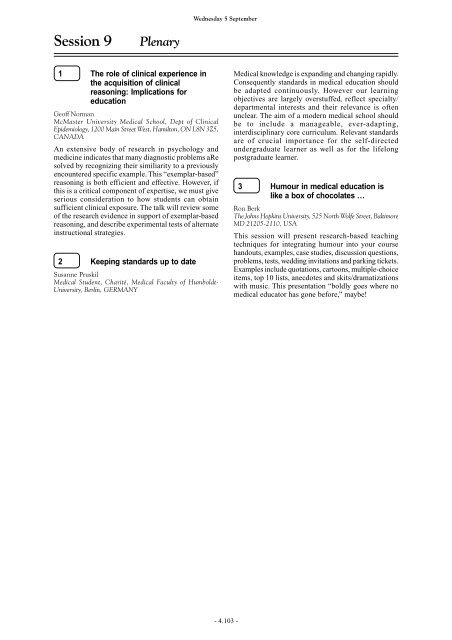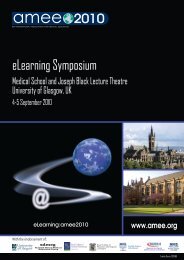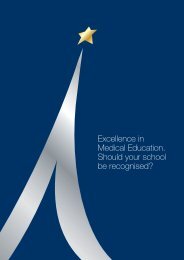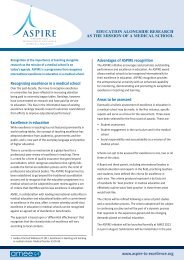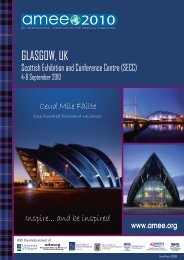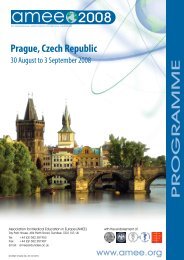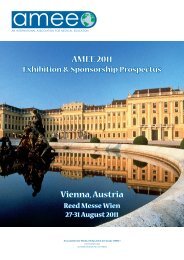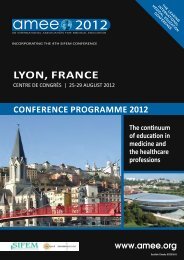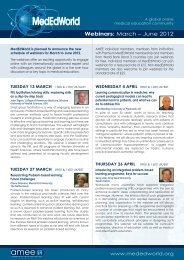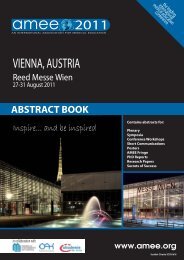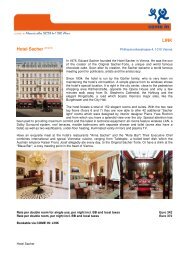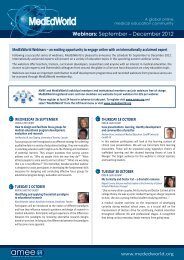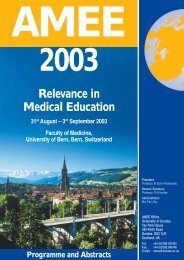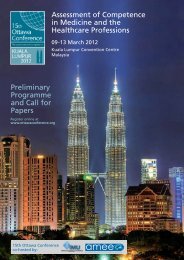AMEE Berlin 2002 Programme
AMEE Berlin 2002 Programme
AMEE Berlin 2002 Programme
You also want an ePaper? Increase the reach of your titles
YUMPU automatically turns print PDFs into web optimized ePapers that Google loves.
Session 9 Plenary<br />
1 The role of clinical experience in<br />
the acquisition of clinical<br />
reasoning: Implications for<br />
education<br />
Geoff Norman<br />
McMaster University Medical School, Dept of Clinical<br />
Epidemiology, 1200 Main Street West, Hamilton, ON L8N 3Z5,<br />
CANADA<br />
An extensive body of research in psychology and<br />
medicine indicates that many diagnostic problems aRe<br />
solved by recognizing their similiarity to a previously<br />
encountered specific example. This “exemplar-based”<br />
reasoning is both efficient and effective. However, if<br />
this is a critical component of expertise, we must give<br />
serious consideration to how students can obtain<br />
sufficient clinical exposure. The talk will review some<br />
of the research evidence in support of exemplar-based<br />
reasoning, and describe experimental tests of alternate<br />
instructional strategies.<br />
2 Keeping standards up to date<br />
Susanne Pruskil<br />
Medical Student, Charité, Medical Faculty of Humboldt-<br />
University, <strong>Berlin</strong>, GERMANY<br />
Wednesday 5 September<br />
- 4.103 -<br />
Medical knowledge is expanding and changing rapidly.<br />
Consequently standards in medical education should<br />
be adapted continuously. However our learning<br />
objectives are largely overstuffed, reflect specialty/<br />
departmental interests and their relevance is often<br />
unclear. The aim of a modern medical school should<br />
be to include a manageable, ever-adapting,<br />
interdisciplinary core curriculum. Relevant standards<br />
are of crucial importance for the self-directed<br />
undergraduate learner as well as for the lifelong<br />
postgraduate learner.<br />
3 Humour in medical education is<br />
like a box of chocolates …<br />
Ron Berk<br />
The Johns Hopkins University, 525 North Wolfe Street, Baltimore<br />
MD 21205-2110, USA<br />
This session will present research-based teaching<br />
techniques for integrating humour into your course<br />
handouts, examples, case studies, discussion questions,<br />
problems, tests, wedding invitations and parking tickets.<br />
Examples include quotations, cartoons, multiple-choice<br />
items, top 10 lists, anecdotes and skits/dramatizations<br />
with music. This presentation “boldly goes where no<br />
medical educator has gone before,” maybe!


